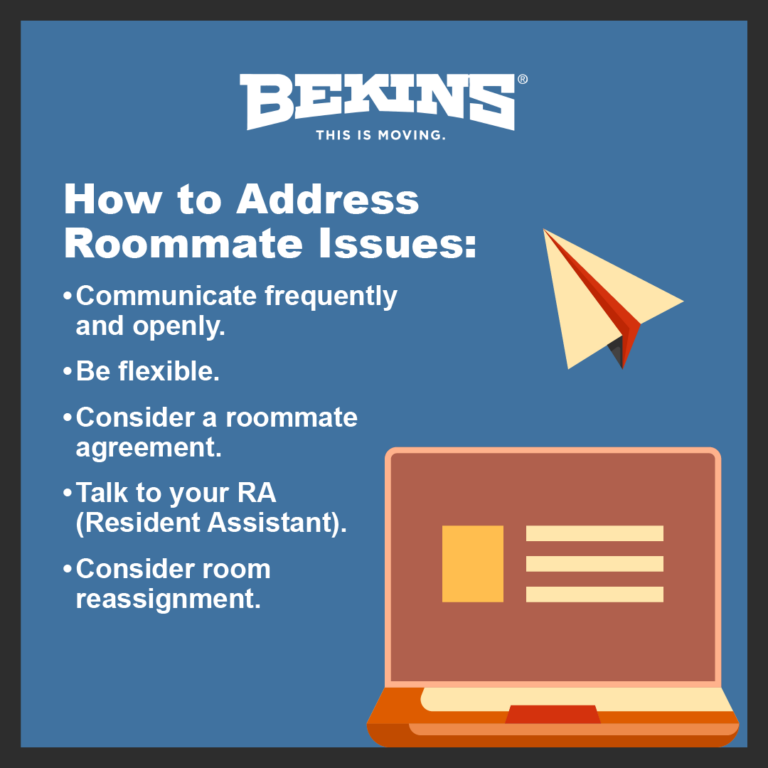Luckily, you can do a few things to make a good impression on your new roommate(s). Follow this guide for tips on how to start off on the right foot—before, during and after the move.

Before the Move: Break the Ice
Getting to know your college roommate before you meet in person can ease those first-day jitters. Most schools provide roommate contact information a few weeks before move-in day, so take advantage of that time to start building a connection.
It’s okay to feel nervous; everyone is in the same boat when it comes to adjusting to dorm life. By asking the right questions, agreeing on move-in logistics and setting clear expectations, you’ll start things off right. Use the following questions as prompts for your introduction.
Questions to Ask Your College Roommate Before Move In
- What are your major and interests? This can help break the ice and find common ground. You might even share classes!
- What are your morning/night routines? Knowing whether you’re rooming with an early bird or a night owl can help you plan your sleep and study schedules.
- Do you have allergies or preferences around food or room scents? This is particularly helpful in shared kitchens or if you plan on using scent diffusers, perfumes or air fresheners.
What items are you bringing for the dorm? Coordinating who brings shared items, like a mini-fridge or microwave, saves space, money and hassle.

During the Move: The First Face-to-Face
Move-in day can be hectic and may also be your first real chance to meet your new college roommate. Make it a priority to introduce yourself right away, even if things are chaotic. It prevents more awkward exchanges later on.
Tips for a Great First Meeting:
- Be friendly and open-minded. Even if you’ve already chatted online, a warm in-person introduction helps break the ice.
- Offer to help each other. You’re both likely juggling boxes and suitcases, so offering a helping hand is a great way to build rapport.
- Discuss shared living space. Once you’re settled in, take time to talk about how you want to organize the room. Decide on things like where each of you will store your items and how you want to arrange any furniture or decorations.
- Bring a new roommate gift. A small gift, such as a plate of cookies, is a simple and kind gesture that may help you earn points with your new roommate.
- Respect everyone’s space. Your roommate may want time to organize their space privately or visit with other friends at school. Give them time and space to adjust in the way that works best for them.
Questions to Ask on Move-In Day:
- Do you have any particular habits I should know about? This could include study patterns, favorite TV shows or even how often you like to clean.
- How do you feel about guests in the room? It’s best to set boundaries early to avoid awkward situations later, especially with overnight guests.
- What’s your ideal sleep schedule? While you might have discussed this earlier, checking in on move-in day is a good way to ensure you’re both on the same page.

After the Move: Fostering Harmony
The first few weeks after move-in are when you’ll truly get to know each other’s habits. This is the time to establish good communication and figure out how to live together harmoniously.
Tips for a Smooth Semester:
- Create a cleaning schedule. Whether you’re a neat freak or tend to be more relaxed, a cleaning routine helps maintain a pleasant living environment for everyone.
- Respect each other’s privacy. Everyone needs alone time, so be mindful of when your roommate needs space to unwind, study or be with other people.
- Share responsibilities fairly. Whether it’s cleaning the room or taking turns buying shared items like toilet paper, dividing tasks evenly helps prevent resentment.
- Spend time together. Make an effort to spend time together and form a strong, comfortable bond. Even a quick dinner out together can help keep a relationship grounded.
- Continue to help. Occasionally assisting your roommate with tasks like cleaning or running errands promotes a positive connection.
- Be willing to listen. Listening when your roommate is having a hard time is a simple but meaningful gesture. Whether it’s about your living arrangement, a significant other or academic challenges, lending an ear can make a big difference and forge a stronger connection.

How to Address Roommate Issues
Conflicts will inevitably arise. When they do, learn to handle them quickly and maturely before they snowball into bigger problems.
- Communicate frequently and openly. If something bothers you, don’t let it fester. Instead, talk about it calmly and respectfully. For example, if your roommate leaves dirty dishes in the sink, say something like, “Hey, do you mind if we agree on when to wash dishes so the sink stays clean?”
- Be flexible. You won’t always agree on everything, and that’s okay. Be willing to compromise on smaller issues, like music volume or how often friends visit.
- Consider a roommate agreement. Many students find it helpful to create a written roommate contract that outlines expectations for things like noise, cleanliness and shared responsibilities. This can serve as a useful reference if issues come up later.
- Talk to your RA (Resident Assistant). Your RA is trained to help resolve roommate conflicts and can mediate difficult conversations.
- Consider room reassignment. If things are truly unmanageable and you’ve tried resolving the issues, a room change may be the best option for both parties. However, this should be a last resort after attempting to work things out.
Roommate Tips for a Positive Year
Sharing a space with a college roommate is a huge part of the college experience. While it may feel a little intimidating at first, following these steps can help you start things off on the right foot. You never know, your college roommate could turn into a lifelong friend!
For help getting your things to that first college meeting, trust the pros at Bekins to start you off on the right foot. Get your estimate today.


